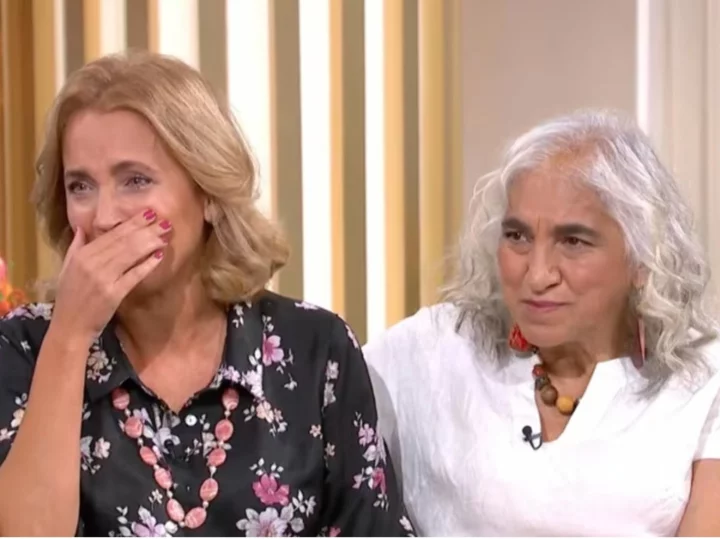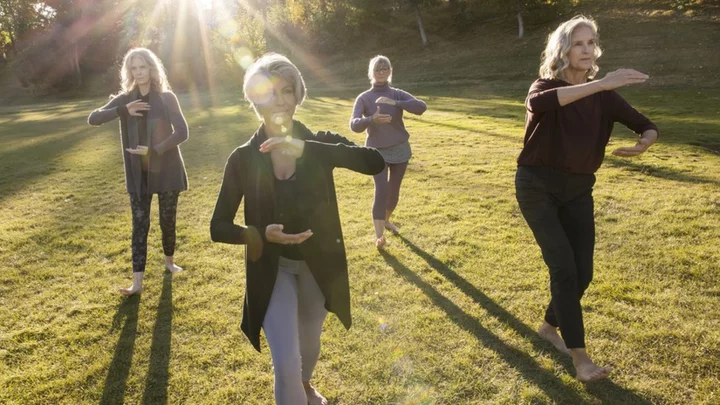
Ethiopian scientist Gebisa Ejeta receives National Medal of Science from US
Gebisa Ejeta, 73, receives the National Medal of Science for developing an improved sorghum hybrid.
2023-10-25 21:56

Watch for these 3 Medigap shopping surprises to avoid overpaying
Medicare Supplement Insurance, or Medigap, can help pay for Medicare Part A and/or Part B copays, coinsurance and deductibles, but shopping for plans isn’t always straightforward
2023-10-25 21:55

Jasmine Harman tearfully recalls mother’s struggles with hoarding
TV presenter Jasmine Harman became emotional as she opened up about her mother’s struggles with hoarding – and how it adversely impacted their relationship for years. The host of Channel 4’s A Place in the Sun, Harman, 47, said she “refused to bring people home” and was “really, really embarrassed and ashamed” about her mum Vasoulla’s condition, on Wednesday (25 October) during an appearance on This Morning. “In fact, when I started working in television, it was my biggest fear that someone would find out about the way I’d grown up and the way that we lived at the time,” she told Dermot O’Leary and Allison Hammond. Reflecting on how things had changed since then, Harman teared up as she affirmed her priority is “having a loving relationship” with Vasoulla – and not “focussing on the hoarding” anymore. Addressing her mother, Harman added: “She’s helped me to become a much more compassionate person. We used to fight, didn’t we? “But now we have a relationship that’s outside [of the hoarding].” Hoarding was recognised as a mental health disorder in 2013. According to the World Health Organisation (WHO), it is characterised by “an accumulation of possessions due to excessive acquisition of, or difficulty discarding possessions, regardless of their actual value”. The Diagnostic and Statistical Manual of Mental Disorders (DSM) outlines detailed criteria that psychologists can use to diagnose hoarding, including cluttered living spaces where the room’s intended use [of cooking, sleeping, or sleeping] has become impossible. These behaviours usually appear during a person’s early life, with Vasoulla explaining it was triggered by “the trauma of loss” in her case. “We moved from Cyprus when I was about three so I left my baby things back home and started collecting trinkets in bombed-out houses that were still about in the early Sixties, after the war – trinkets that I treasured,” she explained. “Then we moved back to Cyprus for a couple of years and those things all got lost. Then we moved back to England and all my new ties got lost – so I just had lots of upheaval, lots of loss.” Vasoulla, whose father was killed in Cyprus, added: “It’s more the loss, like a bereavement. Losing your father is a big thing, moving country ...you lose everything and you get a new place to live. The trauma of loss [is] something that a lot of people have as the onset of their hoarding behaviour.” The mother-daughter duo previously opened up about how hoarding affected their lives in a 2011 BBC documentary, titled My Hoarder Mum & Me. Speaking about the “cathartic experience”, Harman on Wednesday confessed:“I genuinely had no idea how many people were affected by this.” Around three million people are reportedly impacted by the mental health condition, according to Hoarding Disorders UK. The organisation’s director Jo Cook, who joined Vasoulla and Harman on the This Morning couch, explained that hoarding is neither a lifestyle choice, nor “about poor housekeeping”. When asked about supporting loved ones who might struggle with hoarding, Cook recommended joining a support group and approaching the anxiety-based disorder with empathy. “It’s really important that that person that you’re helping, feels safe in their home with you. Because, essentially, you’re unpicking someone’s nest, so you need to make sure you’re doing it slowly and surely,” she added. If you have been affected by this article, you can contact the following organisations for support: actiononaddiction.org.uk, mind.org.uk, nhs.uk/livewell/mentalhealth, mentalhealth.org.uk. Read More Pete Davidson is on the market for a hot date - but not for him Gym math: How to optimise 22 minutes exercise a day according to fitness experts Neglecting women’s health at work could cost UK economy £20.2bn a year – analysis Gym math: How to optimise 22 minutes exercise a day according to fitness experts Neglecting women’s health at work could cost UK economy £20.2bn a year – analysis Nearly three-quarters of mothers feel invisible, study suggests
2023-10-25 21:51

Andre Onana's penalty save record compared to David de Gea and Peter Schmeichel
Andre Onana's penalty save record compared to David de Gea and Peter Schmeichel
2023-10-25 21:47

Five takeaways from Man Utd's Champions League win over Kobenhavn
Key takeaways and analysis from Man Utd's win over Kobenhavn in the UEFA Champions League.
2023-10-25 21:45

New report from PEN America documents vast book bannings in U.S. prisons
A new study from PEN America finds that tens of thousands of books are banned or restricted by U.S. prisons
2023-10-25 21:23

Britain would discuss humanitarian pause in Gaza but not ceasefire - PM's spokesperson
LONDON Britain would discuss a humanitarian pause in the conflict in Gaza to facilitate aid shipments, but does
2023-10-25 20:49

Israel demands UN chief resign over Hamas attack comments
António Guterres condemned Hamas's deadly attacks but said they "did not happen in a vacuum".
2023-10-25 20:46

NFL Week 8 2023: 3 teams on upset alert this Sunday
Week 8 of the 2023 NFL season features 10 interconference battles. Don't miss the excitement and the potential upsets on deck.
2023-10-25 20:29

Americans ran up $105 billion in credit card interest last year alone
Danielle Foskie is among a growing number of Americans who have stumbled into a credit card doom loop.
2023-10-25 20:20

Tai chi may slow Parkinson's symptoms for years, study finds
The traditional gentle Chinese exercise showed balance and movement benefits for patients.
2023-10-25 20:19

Neglecting women’s health at work could cost UK economy £20.2bn a year – analysis
Neglecting women’s health in the workplace could be costing the UK economy around £20.2 billion each year, analysis has suggested. In a new survey of 2,000 women, 68% said that they have dealt with health issues at some point in their career, whilst almost 29% felt their employers were not supportive. When factoring in specific health matters that relate to women, including endometriosis, fertility, menopause and periods, this figure increases to 36%, leaving 46% of women worried that their health could impact their career trajectory and 48% thinking they would be forced to resign. The study conducted by AXA Health in partnership with the Centre of Economics and Business Research (CEBR) also suggested that 83% of women have had their personal finances affected when faced with health issues. For instance, 52% of women have had to take time off, 22% missed out on a promotion and 20% settled for lower pay. Economic modelling from AXA Health and CEBR suggested that ignoring women’s health at work could be costing the UK economy £20.2 billion a year. From 90% of women struggling emotionally, 46% feeling helpless and 43% feeling less motivated at work, this issue has also had a huge impact on their mental health and wellbeing. “As this report finds, neglecting the health of women in our workplaces isn’t just a matter of compassion; it’s a serious economic oversight,” said Flick Drummond MP, who is serving as the co-chair of the All-Party Parliamentary Group on Women and Work. Dr Pallavi Bradshaw, deputy chief medical officer at AXA Health, added: “While companies certainly still have a way to go in addressing women’s health at work, there is promise in the increased willingness of women to discuss their health concerns with colleagues and managers.. “For example, our women’s health report found that 60% of women who talked about their health found their employers to be supportive, whether this be through time off, offering counselling or making adaptations to the workplace. “These developments are positive, but as we delve further into the findings, it becomes evident that concerns extend beyond just health issues. A striking 53% of the women we surveyed voiced that, within their workplaces, women often shoulder more unplanned responsibilities – such as caring for loved ones – than their male counterparts. “Furthermore, when reflecting on their own families, 39% of respondents revealed that they bear a greater burden than male family members when it came to unexpected caring responsibilities. This gender-based imbalance in unpaid labour not only perpetuates inequality but also places women at risk of being sidelined in their careers, overlooked for promotions, or compelled to work beneath their true potential.” Bradshaw said the economic impact of neglecting women’s health is “still significant”, and urged the need for “more education, robust workplace policies and talent retention initiatives”. The report suggested women who work part-time are hit even harder when it comes to health-related issues. It found that 61% are worried about having to leave their jobs prematurely, which exceeds the average by 19%. Only 17% of women who work full-time believe that conversations surrounding women’s health are not encouraged in their workplaces, but this increases to 23% for those who are employed part-time. According to a report conducted by The Royal College of Obstetricians and Gynaecologists, women represent 51% of the population and 47% of the workforce. Read More Nearly three-quarters of mothers feel invisible, study suggests The best ways to work-out in 22 minutes – as study finds this is magic number for offsetting ‘negative impact of sitting’ What crops will we be growing in the future, as climate change alters the landscape? As Rebecca Adlington shares heart-breaking miscarriage news: How to support others experiencing baby loss What you need to know about new research into treating cervical cancer How to do Halloween make up and still take care of your skin
2023-10-25 19:49
